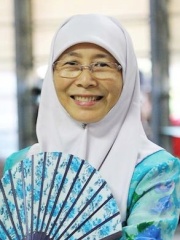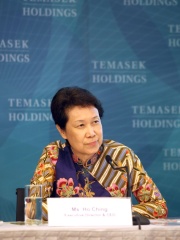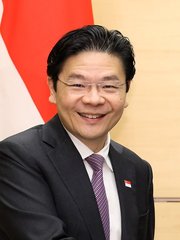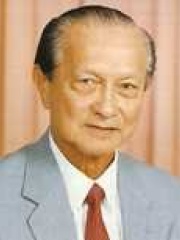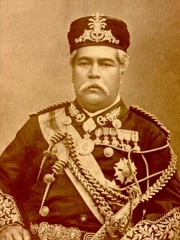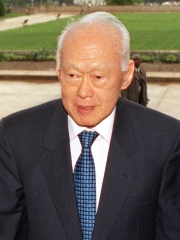
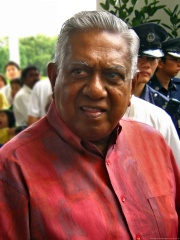
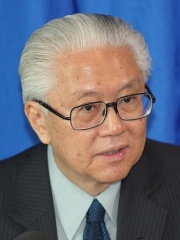
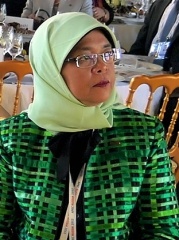
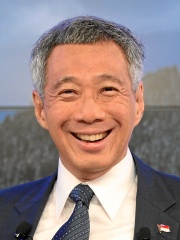
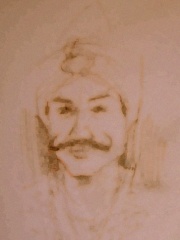
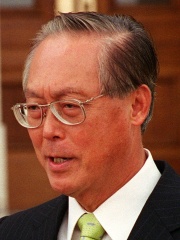

The Most Famous
POLITICIANS from Singapore
This page contains a list of the greatest Singaporean Politicians. The pantheon dataset contains 19,576 Politicians, 15 of which were born in Singapore. This makes Singapore the birth place of the 129th most number of Politicians behind Gabon, and Nauru.
Top 10
The following people are considered by Pantheon to be the top 10 most legendary Singaporean Politicians of all time. This list of famous Singaporean Politicians is sorted by HPI (Historical Popularity Index), a metric that aggregates information on a biography's online popularity. Visit the rankings page to view the entire list of Singaporean Politicians.

1. Lee Kuan Yew (1923 - 2015)
With an HPI of 83.27, Lee Kuan Yew is the most famous Singaporean Politician. His biography has been translated into 100 different languages on wikipedia.
Lee Kuan Yew (born Harry Lee Kuan Yew; 16 September 1923 – 23 March 2015), often referred to by his initials LKY, was a Singaporean statesman and barrister who was the first prime minister of Singapore from 1959 to 1990. A founding father of the modern Singaporean state, his authoritarian political leadership transformed post-independence Singapore into a highly developed country and one of the four Asian Tigers. Born in Singapore during British colonial rule to a family of Chinese descent, Lee studied law in England at Cambridge University and was called to the bar at the Middle Temple in 1950. Shortly after, he returned to Singapore and practised law, founding the law firm Lee & Lee. In 1954, Lee co-founded the People's Action Party (PAP), which won significant support among the working class and trade unions in the lead up to the 1955 general election, securing him a seat in the Tanjong Pagar division and making him the de facto leader of the opposition. In 1959, Lee led the PAP to its first electoral victory, becoming Singapore's first prime minister. Seeking sovereignty from the British Empire, Lee led Singapore to a merger with Malaya along with Sarawak and Sabah, forming Malaysia in 1963. Racial strife and ideological differences later led to Singapore's expulsion from Malaysia and consequent independence in 1965. Lee oversaw major economic reforms and urban development, instituting policies promoting meritocracy, multiracialism and anti-corruption. His administration, generally characterised as an illiberal democracy with nanny state tendencies, restricted press freedoms, public assembly, labour activism and civil liberties. From 1968 to 1981, Singapore was a de facto one-party state, with the PAP facing no opposition in Parliament. Although Lee maintained legal and institutional procedures that formally characterised Singapore as a democratic parliamentary republic, he employed defamation laws, detention without trial and social engineering to ensure continued electoral success. In justifying his policies, Lee was a major proponent of Asian values, arguing that communitarianism and limited human rights were necessary for the social cohesion, political stability and rapid economic development of Singapore. Lee stepped down as prime minister in 1990 but continued to serve in the Cabinet as senior minister until 2004 and subsequently as minister mentor until his retirement in 2011. Throughout his political career, he remained an influential figure in shaping Singapore's domestic and foreign policies, at the same time serving as an advisor to foreign leaders as an elder statesman. Lee died of pneumonia on 23 March 2015 at the age of 91. In Singapore, Lee is widely regarded as instrumental in the development of Singapore's economy, bureaucracy, education system, foreign policy, public housing and healthcare. The Lee Kuan Yew School of Public Policy at the National University of Singapore is named in his honor. Following his death, a week of national mourning was announced, during which approximately 1.7 million people paid their respects at tribute sites around the country.

2. S. R. Nathan (1924 - 2016)
With an HPI of 72.59, S. R. Nathan is the 2nd most famous Singaporean Politician. His biography has been translated into 46 different languages.
Sellapan Ramanathan (IPA: ; 3 July 1924 – 22 August 2016), often known as S. R. Nathan, was a Singaporean civil servant, diplomat and politician who served as the sixth president of Singapore between 1999 and 2011. He was the longest-serving president in the country's history, holding office for two full terms. Prior to his presidency, Nathan held various key positions in the public service, including roles in the Ministry of Foreign Affairs, the Ministry of Home Affairs and the Security and Intelligence Division (SID). He also served as Singapore's High Commissioner to Malaysia and Ambassador to the United States. Nathan was born in Singapore when it was a part of the Straits Settlements. He faced financial difficulties during his childhood, particularly after the death of his father. He left school during his teenage years and worked various jobs during the Japanese occupation of Singapore in World War II, including as a translator. After the war, he resumed his education and graduated with a Diploma in Social Studies from the University of Malaya's Singapore division in 1954. He began his civil service career in the Labour Ministry in 1955 and later moved to the Foreign Ministry. In the course of his civil service career, Nathan held several senior appointments, including Director of the SID and Permanent Secretary of the Ministry of Foreign Affairs. In 1974, during the Laju incident, he volunteered to accompany members of the Japanese Red Army and Popular Front for the Liberation of Palestine out of Singapore to ensure the safe release of civilian hostages, a move that drew national and international attention. He later served as Executive Chairman of The Straits Times Press from 1982 to 1988, High Commissioner to Malaysia from 1988 to 1990 and Ambassador to the United States from 1990 to 1996. Nathan was elected President of Singapore in 1999 and re-elected in 2005, both times unopposed after other prospective candidates were deemed ineligible. His presidency, largely ceremonial in accordance with the Constitution, was marked by public engagement and support for charitable causes, including the launch of the President's Challenge in 2000. Following his retirement in 2011, he continued to contribute to public life through writing and advisory roles. He died in 2016 at the age of 92 and was accorded a state funeral.

3. Tony Tan (b. 1940)
With an HPI of 72.37, Tony Tan is the 3rd most famous Singaporean Politician. His biography has been translated into 52 different languages.
Tony Tan Keng Yam (Chinese: 陈庆炎; pinyin: Chén Qìngyán; born 7 February 1940) is a Singaporean banker and politician who served as the seventh president of Singapore between 2011 and 2017 after winning the 2011 presidential election. Prior to entering politics, Tan was a general manager at OCBC Bank. He made his political debut in the 1979 by-elections as a People's Action Party (PAP) candidate contesting in Sembawang Group Representation Constituency and won. He later served as Deputy Prime Minister of Singapore from 1995 to 2005. After resigning from the cabinet in 2005, Tan was appointed deputy chairman and executive director of GIC, chairman of the National Research Foundation, and chairman of Singapore Press Holdings (SPH). He stepped down from all his positions in 2010 before contesting the 2011 presidential election as an independent candidate. Tan won the 2011 presidential election in a four-way fight and served as the president of Singapore until 2017. He did not seek re-election in the 2017 presidential election, which was reserved for Malay candidates following a constitutional amendment. He officially retired on 1 September 2017 at the end of his presidential term. He was succeeded by Halimah Yacob on 14 September 2017.

4. Halimah Yacob (b. 1954)
With an HPI of 68.11, Halimah Yacob is the 4th most famous Singaporean Politician. Her biography has been translated into 67 different languages.
Halimah binte Yacob (born 23 August 1954) is a Singaporean politician and lawyer who was the eighth president of Singapore from 2017 to 2023, making her the first woman to serve in this role after being elected uncontested in the 2017 presidential election. A former member of Singapore's long-dominant People's Action Party (PAP), Halimah served as the Member of Parliament (MP) for the Bukit Batok East division of the Jurong Group Representation Constituency (GRC) from 2001 to 2015 and then for the Marsiling division of the Marsiling–Yew Tee GRC from 2015 to 2017. She became Singapore's first female speaker of parliament, a position she held from 2013 to 2017. Following a constitutional amendment in 2016, the 2017 presidential election was reserved for candidates from the Malay community. To qualify, Halimah resigned from the People's Action Party (PAP) and her position as Member of Parliament (MP), with her Marsiling–Yew Tee GRC division covered by other members on 7 August 2017. She ran as an independent candidate, as required for eligibility, and subsequently won in an uncontested election because her rivals did not meet the necessary qualifications. During her presidency, Halimah utilised her discretionary powers to approve emergency funding for Singapore's response to the COVID-19 pandemic and advocated for women's rights. She chose not to seek re-election in the 2023 presidential election, concluding her term on 13 September 2023, after which she was succeeded by Tharman Shanmugaratnam.
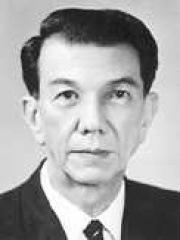
5. Benjamin Sheares (1907 - 1981)
With an HPI of 67.29, Benjamin Sheares is the 5th most famous Singaporean Politician. His biography has been translated into 31 different languages.
Benjamin Henry Sheares (12 August 1907 – 12 May 1981) was a Singaporean obstetrician, gynaecologist, and academic who served as the second president of Singapore between 1971 until his death in 1981. Born in Singapore under British rule, Sheares graduated from the King Edward VII College of Medicine in 1929. He specialised in obstetrics and gynaecology and worked at the Singapore General Hospital and Kandang Kerbau Hospital (KKH), eventually serving as the acting professor of obstetrics and gynaecology at the University of Malaya in Singapore. He later became the professor of obstetrics and gynaecology in 1950, becoming the first local to rise to such a position as high-ranking colonial officers were usually appointed instead. Sheares retired in 1961 due to health complications and went into private practice before being elected as the president of Singapore by parliament following the death of incumbent president Yusof Ishak. Sheares was sworn in on 2 January 1971 following a unanimous agreement by Parliament and served as the president of Singapore for three terms, from 2 January 1971 till his death in office on 12 May 1981. He was succeeded by Devan Nair on 23 October 1981. During his presidency, he officiated multiple events and ceremonies such as the 1971 Commonwealth Heads of Government Meeting and the 1973 South East Asian Peninsular Games. Regarded as "the father of obstetrics and gynaecology in Singapore", Sheares was known for standardising the lower Caesarian section in Singapore and creating an artificial vagina. The lower Caesarian section has since become the standard procedure in Singapore whilst his method to create an artificial vagina has been dubbed the "Sheares operation" and is used to help women who suffer from birth defects such as vaginal agenesis or in sex-change operations. Sheares remains the only president to have been elected for three terms. Both the Benjamin Sheares Bridge and Sheares Hall at the National University of Singapore (NUS) are named after him.

6. Lee Hsien Loong (b. 1952)
With an HPI of 67.14, Lee Hsien Loong is the 6th most famous Singaporean Politician. His biography has been translated into 68 different languages.
Lee Hsien Loong (born 10 February 1952), also known by his initials LHL, is a Singaporean politician and former military officer who has served as the Senior Minister of Singapore since 2024, having previously served as the third Prime Minister between 2004 and 2024. He also served as the secretary-general of the governing People's Action Party (PAP) between 2004 and 2024. As a Member of Parliament (MP), he has represented the Teck Ghee division of Ang Mo Kio Group Representation Constituency (GRC) since 1991, having previously represented Teck Ghee Single Member Constituency (SMC) between 1984 and 1991. Born and raised in Singapore during British colonial rule, Lee is the eldest son of Singapore's first prime minister, Lee Kuan Yew. He graduated from Trinity College, Cambridge, in 1974 with first class honours in mathematics and a Diploma in Computer Science with distinction (equivalent to a first-class master's in computer science). He served in the Singapore Armed Forces (SAF) between 1971 and 1984, and attained the rank of Brigadier-General, completing a Master of Public Administration degree at Harvard Kennedy School in 1980. Lee discharged from the SAF in 1984 to enter politics. Lee served in several cabinet posts under prime ministers Lee Kuan Yew and Goh Chok Tong before assuming the office of prime minister in August 2004. In his first two years, his government enacted a five-day work week and extended maternity leave. His proposal to build two integrated resorts in Singapore to increase tourism revenue led to the development of the Marina Bay Sands and Resorts World Sentosa. Following the Great Recession of 2008, he oversaw the country's economic recovery within two years. Political reforms in 2010 saw an increase in the number of non-constituency members of parliament. In 2020 and 2021, Lee oversaw the government response to the COVID-19 pandemic and its associated recession and recovery. In 2022, he also oversaw the government response to the Russian invasion of Ukraine, making Singapore the only Southeast Asian country to impose sanctions on Russia. That same year, his government legalised same-sex sexual activity between men by repealing the unenforced colonial-era Section 377A. In April 2024, Lee announced that he would not seek a sixth term as prime minister in the forthcoming general election; he was succeeded by Lawrence Wong, who formed a new cabinet and subsequently appointed Lee as a senior minister. Lee's premiership had been marked by maintaining political continuity, institutional stability and technocratic governance under the PAP. He implemented incremental political reforms and social policy enhancements such as expanded safety nets and public housing to address inequality. However, his tenure drew criticism for the continued high level of control exercised over political discourse similar to his father. His use of defamation lawsuits against journalists, bloggers and opposition figures including cases involving Roy Ngerng and Leong Sze Hian was widely reported and criticised as a means of discouraging further dissent. His leadership was also marked by a public family dispute with his siblings over the fate of their late father's house at 38 Oxley Road, which attracted significant media attention and public debate. His government's reliance on laws such as the Protection from Online Falsehoods and Manipulation Act (POFMA) also raised concerns about its chilling effect on free speech and democratic discourse. As prime minister, Lee was the highest-paid head of government in the world, a status that has continued under Wong's leadership.

7. Parameswara (1344 - 1414)
With an HPI of 65.39, Parameswara is the 7th most famous Singaporean Politician. His biography has been translated into 20 different languages.
Parameswara (1344 – c. 1414), thought to be the same person named in the Malay Annals as Iskandar Shah, was the last king of Singapura and the founder of Malacca. According to the Malay Annals, he ruled Singapura from 1389 to 1398. The king fled the island kingdom after a Majapahit naval invasion in 1398 and founded his new stronghold on the mouth of Bertam river in 1402. Within decades, the new city grew rapidly to become the capital of the Malacca Sultanate. Portuguese accounts however, written a hundred years after his death, suggest he was from Palembang in Sumatra and usurped the throne of Singapura; he was driven out, either by the Siamese or the Majapahit, and went on to found Malacca.

8. Goh Chok Tong (b. 1941)
With an HPI of 65.03, Goh Chok Tong is the 8th most famous Singaporean Politician. His biography has been translated into 48 different languages.
Goh Chok Tong (born 20 May 1941) is a Singaporean retired politician who served as the second prime minister of Singapore from 1990 to 2004 and as a senior minister of Singapore from 2004 to 2011. He served as the secretary-general of the People's Action Party (PAP) from 1992 to 2004 and was the member of Parliament (MP) for Marine Parade Single Member Constituency from 1976 to 1988, and Marine Parade Group Representation Constituency from 1988 to 2020. Prior to his appointment as prime minister, he was the country's deputy prime minister, where he advocated for the Medisave, a savings scheme that allows Singaporeans to set aside part of their income into a Medisave account to meet future medical expenses. Goh also advocated for the Edusave Awards, a monetary reward for students who did well in school based on either their academic achievements or character to enshrine meritocracy. Shortly before and during his tenure as prime minister, Goh proposed political reforms like the introduction of Non-Constituency Members of Parliament (NCMP), to allow more opposition into Parliament, Group Representation Constituencies (GRC), to make sure that minorities are represented in Parliament and Nominated Members of Parliament (NMP), to have independent opinions in Parliament since all NMPs are non-partisan. Goh assumed the responsibility of government in a carefully managed leadership transition. Goh enacted the Elected President scheme in 1991 as presidents before were appointed by Parliament. He also introduced the Vehicle Quota Scheme to limit the number of vehicles in the city-state. On 12 August 2004, Goh was succeeded by Lee Hsien Loong, the eldest son of Singapore's first prime minister, Lee Kuan Yew, and was subsequently appointed as a senior minister in the Cabinet and chairman of the Monetary Authority of Singapore (MAS) between 2004 and 2011. He resigned from the Cabinet in 2011, and was given the honorary title of "Emeritus Senior Minister" by Lee. He stepped down as a Member of Parliament (MP) and retired from politics in 2020.

9. Tharman Shanmugaratnam (b. 1957)
With an HPI of 63.04, Tharman Shanmugaratnam is the 9th most famous Singaporean Politician. His biography has been translated into 41 different languages.
Tharman Shanmugaratnam (born 25 February 1957) is a Singaporean politician and economist who has been the current and ninth President of Singapore since 2023 after winning the 2023 presidential election. Prior to his presidency, Tharman served as Senior Minister of Singapore between 2019 and 2023, Chairman of the Monetary Authority of Singapore between 2011 and 2023, and Deputy Prime Minister between 2011 and 2019. He also served as Coordinating Minister for Economic and Social Policies between 2011 and 2015, Minister for Finance between 2007 and 2015, Minister for Education between 2003 and 2008 and Minister for Manpower in 2011 and 2012. A former member of the governing People's Action Party (PAP), he was the Member of Parliament (MP) representing Jurong Group Representation Constituency (GRC) between 2001 and 2023. Tharman made his political debut in the 2001 general election, and had been re-elected to Parliament four times at subsequent general elections in 2006, 2011, 2015 and 2020. In June 2023, Tharman announced his intention to run for the presidential election. On 7 June 2023, Tharman resigned from both the PAP and Parliament as the presidency is a non-partisan office. On 2 September, Tharman was announced as the winner after receiving 70.4% of the vote in a landslide victory and was elected as the ninth president of Singapore. He is the first presidential candidate of non-Chinese descent to win a contested presidential election in Singapore.
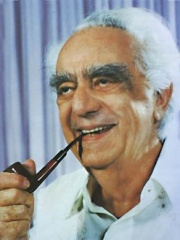
10. David Marshall (1908 - 1995)
With an HPI of 61.69, David Marshall is the 10th most famous Singaporean Politician. His biography has been translated into 20 different languages.
David Saul Marshall (né Mashal; 12 March 1908 – 12 December 1995) was a Singaporean lawyer, politician, and diplomat who served as the first chief minister of Singapore from April 1955 to June 1956. He resigned after just over a year into his chief ministership after his delegation to London regarding negotiations for self-governance was rejected by the British. Marshall was born in colonial Singapore to Jewish parents and studied at Saint Andrew's Secondary School and Raffles Institution. He held down different jobs from 1926 to 1934, eventually saving up enough money to study law at the University of London. He returned to Singapore in 1937 to begin his law practice. In 1938, Marshall began volunteering with the Singapore Volunteer Corps. Following the surrender of Singapore, Marshall was made a prisoner-of-war (POW) and interned at Changi Prison before being sent to Japan to do manual labour. He returned to Singapore in 1946 after the Japanese's surrender. He then joined the Singapore Association, which merged to form the Progressive Party (PP) to contest in the 1948 general election. Following disputes with the PP and its leader C. C. Tan, Marshall left in 1953 and would be a part of the creation of the Labour Front (LF), serving as its first chairman. The LF contested at the 1955 general election, where they won the most seats with 10, and Marshall was named the chief minister as the LF's leader. Marshall's chief ministership was marked with strikes and riots, a constitutional crisis, and internal problems with the LF. His main goal was gaining self-governance for Singapore, and he led a delegation to London in 1956 to hold constitutional talks with British authorities. However, the constitutional talks would break down and he subsequently resigned as chief minister after having promised to do so, had he not managed to achieve self-governance. He remained a backbencher and was succeeded by Lim Yew Hock. Marshall then resigned from the LF and the Legislative Assembly in 1957, and founded the Workers' Party (WP) to contest in the upcoming 1959 general elections. At the 1959 general elections, he lost to Lim, but won Anson at the 1961 by-elections. Marshall would resign from the WP following internal arguments, and later lost his seat at the 1963 general election. Following this, Marshall left politics and returned to law. In 1978, Marshall became a diplomat at the invitation of foreign minister S. Rajaratnam and was Singapore's inaugural ambassador to various countries, including France, Portugal, Spain, and Switzerland. During this time he defended Singapore's interests abroad, despite his old political opponent Lee Kuan Yew of the People's Action Party having long led the government as prime minister. Nevertheless, he publicly maintained constructive criticism of some domestic policies with which he disagreed. Marshall retired in 1993 and died two years later in 1995, at the age of 87.
People
Pantheon has 15 people classified as Singaporean politicians born between 1344 and 1972. Of these 15, 8 (53.33%) of them are still alive today. The most famous living Singaporean politicians include Tony Tan, Halimah Yacob, and Lee Hsien Loong. The most famous deceased Singaporean politicians include Lee Kuan Yew, S. R. Nathan, and Benjamin Sheares. As of April 2024, 1 new Singaporean politicians have been added to Pantheon including Lawrence Wong.
Living Singaporean Politicians
Go to all RankingsTony Tan
1940 - Present
HPI: 72.37
Halimah Yacob
1954 - Present
HPI: 68.11
Lee Hsien Loong
1952 - Present
HPI: 67.14
Goh Chok Tong
1941 - Present
HPI: 65.03
Tharman Shanmugaratnam
1957 - Present
HPI: 63.04
Wan Azizah Wan Ismail
1952 - Present
HPI: 58.14
Ho Ching
1953 - Present
HPI: 57.18
Lawrence Wong
1972 - Present
HPI: 55.88
Deceased Singaporean Politicians
Go to all RankingsLee Kuan Yew
1923 - 2015
HPI: 83.27
S. R. Nathan
1924 - 2016
HPI: 72.59
Benjamin Sheares
1907 - 1981
HPI: 67.29
Parameswara
1344 - 1414
HPI: 65.39
David Marshall
1908 - 1995
HPI: 61.69
Wee Kim Wee
1915 - 2005
HPI: 59.79
Abu Bakar of Johor
1833 - 1895
HPI: 58.60
Newly Added Singaporean Politicians (2025)
Go to all RankingsOverlapping Lives
Which Politicians were alive at the same time? This visualization shows the lifespans of the 6 most globally memorable Politicians since 1700.

